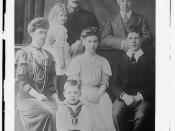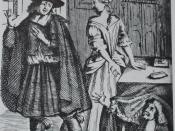The play Tartuffe, by Moliere, is a work that was created to show people a flaw in their human nature. In this play Moliere targets religious hypocrites and he uses realistic characters that brings about harsh criticism by the public. The play pleased the King, but he banned it from public performance because of strong objection by officials of the Catholic Church.
Moliere protested that the play get permission for a public performance by writing three petitions to the King Louis. The king was baffle because he listened to the negative comments the public and member of the church presented on the play Tartuffe. In the first petition Moliere informs the king that many people of the public find the play appealing and they find nothing wrong with the play. He states that the duty of comedy is to correct men by amusing them. Moliere believed he performed a service on behaved of all the good men of the public and of the King's kingdom by writing a comedy, which denounced hypocrites.
He tells the King that the churches have taken advantage of his delicacy feelings on religious matters, and that they have deceived him on the only side of his character. He begged the King to remove all complaints on his work because he knew that the King himself and most churchmen found nothing wrong with the comedy.
In the second petition Moliere emphasizes again how the play received glorious declaration from private readers of the book and by many churchmen. He tells the king that hypocrites found ways of persuading and deriving him, and that they cared little about religion, but only cared about how the play made fun of them. He also tells him that the people of Paris are shocked by the ban and...

![King [Haakon] and Queen [Maud] of Norway and [Crown] Prince Olaf (LOC)](https://s.writework.com/uploads/11/119823/king-haakon-and-queen-maud-norway-and-crown-prince-olaf-loc-thumb.jpg)
